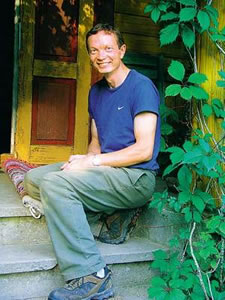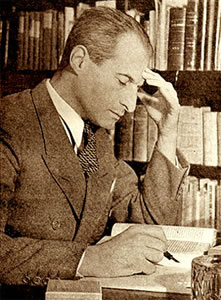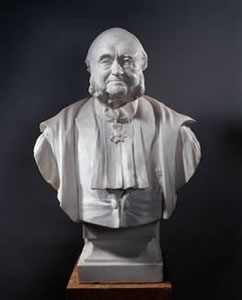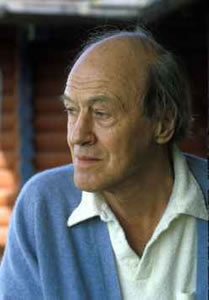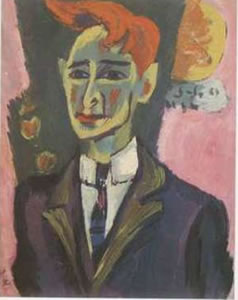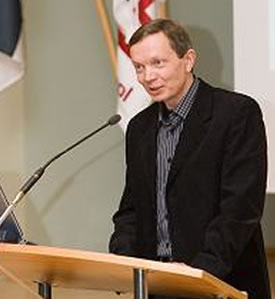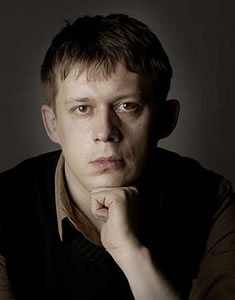De Estische dichter, schrijver en vertaler Tõnu Õnnepalu werd geboren op 13 september 1962 in Tallin. Zie ook mijn blog van 13 september 2008en ook mijn blog van 13 september 2009.
A clear morning after the rain in March
can suddenly seem as if it was October
and the mind becomes sad
because the sky is so painfully clean
and the poplars leafless
and suddenly
I know nothing
about the sap swelling their buds
for inside me there swells the tide of sadness
and I am buried under the cool wave of light
longing and fear
and something else
as an empty seashore in the autumn with sun in October
though now it is March
***
There is no freedom spring air
glowing and surging around us
on this festival of the last melting snow
when the alder catkins
are heavy with yellow dust
and the earth is heavy with water
and the eyes feel heavy wwith the beauty of light
when joy
comes and races
hands free down the hill
the lark falls through the air
when the sky
enfolds us into its perfect void
whose colours have no name
blue blue blue
a thousand times everything
with different meanings but
the dead grass and the earth
smell as for the first time in my life
and the pines
begin to rustle
when suddenly
an icy cold damp gust of wind from the sea
and the pinetops swaying in the sky
as if in the midst of a great sadness
for there is no freedom

Tõnu Õnnepalu (Tallin, 13 september 1962)
De Poolse schrijver Janusz Glowacki werd geboren op 13 september 1938 in Poznań. Na zijn studie Pools aan de Universiteit van Warschau begon hij in 1964 samen te werken met het tijdschrift Kultura in Warschau, waar hij al snel opgemerkt werd door zijn ingenieuze korte verhalen en schetsen. Einde jaren 1960 begon hij te wereken als scenarioschrijver. Tijdens deze periode ontstond onder meer de film Vliegenjacht (Polowanie na muchy), geregisseerd door Andrzej Wajda en de cult-film Rejs door Marek Piwowski. Na de instelling van de noodtoestand in 1981 verliet Glowacki Polen en vestigde zich in de VS, waar hij nog steeds woont. Hij schreef sindsdien vooral een aantal drama’s die internationaal worden gespeeld. Zijn grootste succes was het toneelstuk Antigone in New York in 1992.
Uit: Aus dem Kopf (Vertaald door Heinz Rosenau)
„Am Abend des 18. Dezember 1981 drängte ich mich durch Scharen von Pilzen, Engeln, Weihnachtsmännern und Zwergen zu meinem Auftritt in der meistgesehenen Weihnachtssendung im englischen Fernsehen. Das klingt nicht schlecht und es hätte auch gar nichts daran auszusetzen gegeben, wären da nicht die besonderen Umstände gewesen.
Zehn Tage zuvor hatte ich in meiner Wohnung auf der Bednarski-Straße in Warschau meinen verzierten Schweinsledergürtel um meine schwarzen Ausgehhosen aus feinstem Struck geschlungen, meine Schuhe blank geputzt, so dass sie nach was aussahen, und mich, getrieben von der Gier nach Reichtum und Ruhm, nach London aufgemacht, zur Premiere meines Stückes Cinders, Aschenkinder, im Royal Court Theatre. Hinter mir ließ ich Streiks, Verhandlungen, Gummiknüppel und ein allem Eindruck nach schon stark ins Wanken geratenes kommunistisches Regime, aber auch meine Mutter, meine zweieinhalb Jahre alte Tochter Zuzia, der ich versprochen hatte, eine Puppe aus London mitzubringen, sowie meine damalige Verlobte und spätere Ehefrau Ewa Zadrzyńska, die sich keine Illusionen über das sittliche Niveau dieser Geschichte macht und sich deshalb ausgebeten hat, dass ihr Name in diesem Buch kein einziges Mal auftauchen wird. Ich habe es ihr versprochen, jedoch ohne mein Wort zu halten, was übrigens auf die Mehrzahl der Versprechen zutrifft, die ich ihr und anderen Frauen gegeben habe.
Selbstverständlich hatte keiner meiner Warschauer Freunde, denen ich voller Stolz verkündet hatte, dass eines der besten Londoner Theater mein Stück aufführen werde, mir auch nur einen Augenblick lang geglaubt. Sicher, sie hatten höflich genickt und mir gratuliert, sich jedoch hinter meinem Rücken viel sagende Blicke zugeworfen. Da ich ein Rückflugticket für den 22. Dezember hatte, nahm ich nur einen leeren Koffer für Geschenke, ein Paar Jeans, zwei Hemden und fünfundzwanzig Pfund in bar mit.“

Janusz Glowacki (Poznań, 13 september 1938)
De Poolse dichter Julian Tuwim werd geboren in Łódź op 13 september 1894. Zie ook mijn blog van 13 september 2008 en ook mijn blog van 13 september 2009.
The Saturday Night Song
Hooray, the echo will resound throughout the wide square,
When a sincere drunkard’s song emanates from my throat;
Tonight I’ll be lapping up a smoky pub’s atmosphere,
I’m bloody well going to get sloshed, buzzed and somewhere float.
My spirit gorged, I’ll bang the table with my strong fist,
Searching for a little brightness from these gloomy days-
Take no more you soft touch! Liberty! May the vile twists
Of my ricketed brats in the garret rot away.
I’ll drink-smash everything in sight but never mind,
I’ll pay myself! Can I not afford to break a glass or two?
I can, you bastards! With the rubles from my black grind
I could even have two dozen mistresses to woo.
I smash-because I feel like it! Hang it all! Freedom! I’ve power!
Run, spirit, till dawn. Out of the way. Today we rule!
And when I leave the pub with hands in the pocket of my trousers
I’ll stagger wide down the drunken street, nobody’s fool!
Vertaald door Barry Keane
Polish Flowers
A box with paints from childhood’s time:
The colors of town are earth and grime.
An old worker at a dark doorway squats,
The spuds in his bowl are powdery dry.
It’s a face of yellowish and gray spots
In the midst of hunger, cold, dirt and slime.
Vertaald door Frank Fox

Julian Tuwim (13 september 1894 – 27 december 1953)
Portret door Stanisław Ignacy Witkiewicz
De Amerikaanse schrijver, journalist en scenarist Warren Murphy werd geboren op 13 september 1933 in Jersey City, New Jersey. Murphy is het best bekend als co-auteur van “The Destroyer” serie. Hij werkte als verslaggever en redacteur en na zijn diensttijd tijdens de Koreaanse Oorlog ging hij de politiek in. Hij was ook assistent-professor aan het Moravian College in Bethlehem, Pennsylvania. Murphy schreef ook het scenario voor “Lethal Weapon”. Hij is de auteur van de serie Trace en Digger. Twee boeken van een geplande trilogie rond het karakter van “De Grootmeesterr” (De Grand Master), schreef hij samen met Molly Cochran. Murphy publiceerde verscheidene romans met haar onder de naam Dev Stryker. Enkele van zijn onder eigen naam verschenen romans zijn Jericho Day, The Red Moon en Honor Among Thieves. Een paar jaar geleden richtte Murphy zijn eigen uitgeverij Ballybunion op om de spin-off boeken van The Destroyer uit te geven..
Uit: Killing Time
„The vintage 1940 Rolls-Royce Silver Shadow glided noiselessly through New York’s Central Park, its smoked windows sealing off the lilting strains of Pachelbel’s Canon from the humdrum sounds of the city.
Inside, behind the liveried chauffeur, sitting in a sea of velvet the color of his dark wavy hair, Dr. Felix Foxx sipped at a daiquiri from a glass of cut Baccarat crystal. He pressed a button on the partition between the front and rear seats.
“Any joggers?” he asked the chauffeur.
“No, sir.”
“Keep looking,” Foxx said in richly modulated tones, and switched the microphone off.
Ah, this was the life, he thought as he sniffed a rose in its Lalique bud vase. He finished his drink and set the glass back into the small lacquer bar built into the Rolls. He slid his hand over his $55 tie from Tripler and the flawlessly tailored lapels of his $1200 Lanvin suit. He looked down at his Botticelli shoes, gleaming a dark mahogany against the white plush of the carpeting.
A perfect life.
The rear speakers buzzed to attention. “Joggers, sir.”
Foxx’s eyes narrowed into hard little slits. “Where?”
“Ahead and to the left, Dr. Foxx.”
He peered through the darkened glass. Ahead, running alongside the road, were a man and woman dressed in running clothes, their Adidas sneakers kicking up the dust behind them. Their faces were flushed and glistening with sweat.
“Get into position,” he said.“

Warren Murphy (New Jersey, 13 september 1933)
De Duitstalige, Roemeense, schrijver en pastor Eginald Schlattner werd geboren in Arad op 13 september 1933. Hij groeide op in Fagaras – aan de voet van de Karpaten – en studeerde tot zijn uitzetting evangelische theologie in Cluj, gevolgd door wiskunde en hydrologie. In 1957 werd hij gearresteerd en in 1959 voor “het niet rapporteren van hoogverraad” veroordeeld. Na zijn vrijlating werkte hij als arbeider en later als ingenieur. Schlattner nam in 1973 opnieuw zijn theologische studies weer op. Hij was protestants dominee in Roşia nabij Sibiu tot aan zijn pensionering en werkte ook als gevangenis-kapelaan in Gherla. Zijn drie gepubliceerde romans behandelen op autobiografische wijze het leven van etnische groepen, vooral de Duitse minderheid, in Transsylvanië (deels ook in Banat aan de Zwarte Zee kust) tussen 1943 en het einde van de jaren 1950.
Uit: Rote Handschuhe
„Der kleine Mann steht hinten in der Zelle mit dem Rücken zu mir. In der Düsternis ist er kaum auszumachen. Seine Kleider muten altmodisch an. Er reicht mir die Hand, sagt leise: “Grüß Gott! Mein Name ist Rosmarin”, und tippt an die verwaschene Baskenmütze, “Anton Rosmarin aus Temesvar.” Er verbeugt sich.
“Sagen Sie mir nicht, seit wann Sie hier sind. Ich halte es keine Stunde mehr aus.” Als ich mich aufs Bett strecke, stelle ich am Strohsack fest, daß es eine andere Zelle ist als die von heute nacht.
“Liegen darfst nicht”, sagt er sanftmütig.
“Die müssen mich rauslassen. Es ist ein Mißverständnis.”
“Das glaubt im Anfang jeder Teifi”, flüstert er. “Jetzt aber tu aufstehn. Wenn der draußen dir sieht liegen, bestraft er dir, du wirst stehn in der Ecken auf einem Fuß: Storch heißt das. Ich kenn mich aus beim Wurschtkessel. Seit sechs Jahren bin ich hier.”
“Seit sechs Jahren! Wo, hier? In diesem Loch?”
“Hier in dieser Stuben nur seit sieben Monate. Aber allein.” Ich ziehe den Mantel über mein Gesicht und sage weinerlich aus dem Halbdunkel: “Ich will nichts wissen. Nicht seit wann. Nicht warum. Nichts, gar nichts. Verschonen Sie mich gefälligst.”
Er schiebt den Mantel von meinem Gesicht weg, sagt: “Aber bald bin ich frei, die letzten zwei Jahr schenken’s mir. Wenn ich tu kommen nach Haus”, er schluckt, wischt den Speichel von den Lippen, das einzig Glänzende in seinem fahlen Gesicht, “dann tritt ich in die Kuchel, dann sag ich: Mitzi, sag ich, da bin ich, jetzt will ich essen, essen will ich brânza? mit Zwiefel!” Dabei zerhackt er mit der rechten Hand die Luft. “So will ich die Zwiefel! Geschnitten finom. Und den Käs will ich in Stückerln. Und nachher erst tu ich fragen: Wo sein die Kinder? Die Emma und der Toni? Die erkennen mir sowieso nicht. Und dann leg ich die Mitzi überm Kucheltisch aufs Nudelbrett, und dann tut’s scheppern!” Pause. Er flüstert: “Meiner Seel, Sie sein ein rarer Vogel. Der gardian hat geglotzt herein, lange, und hat nichts krakeelt.”

Eginald Schlattner (Arad, 13 september 1933)
De Duitse dichter en schrijver Johannes Poethen werd geboren in Wickrath op 13 september 1928.
Poethen bezocht scholen in Keulen, Weingarten en Malching in Opper-Beieren. In 1944 werd hij opgeroepen voor militaite dienst. Na de Tweede Wereldoorlog behaalde hij in 1948 het gymnasiumdiploma in Keulen en studeerde hij Germaanse filologie en klassieke filologie (met de nadruk op de Griekse mythologie) aan de Universiteit van Tübingen. Vanaf 1949 maakte hij verscheidene reizen naar Griekenland en andere mediterrane landen. Poethen leefde als freelance schrijver in Hirschau in Tübingen. Vanaf 1956 was hij een freelance medewerker van de Süddeutsche Rundfunk in Stuttgart. Van 1978 tot 1991 was hij hoofd van de afdeling voor Literatuur en Kunst bij dezelfde zender. Hij was een van de initiatiefnemers van het Stuttgarter Schriftstellerhaus. Poethen schreef vooral poëzie die aanvankelijk was beïnvloed door dichters als Eichendorff en Hölderlin. In de jaren zeventig nam Poethens werk een wending naar meer vrije vormen, waarin hij zich kritisch bezig hield met de problemen van de hedendaagse samenleving.
Hol über
Du nimmst dir was vor
wörter
wie sie jetzt kommen
schon haben sies in sich
setzen wir uns zusammen
bis es paßt
bis es ganz
für sich allein
da ist.
2
Dazu dies geflüster innen
plötzlich wieder
woanders her
als müßt ich sie erkennen
die lippen
wie sie sprächen
von außen mir zu
nicht mehr allein
in meinem körper
bloß ich.

Johannes Poethen (13 september 1928 – 9 mei 2001)
De Nederlandse dichter, predikant en hoogleraarr Nicolaas Beets werd geboren op 13 september 1814 in Haarlem. Zie ook mijn blog van 13 september 2006 en ookmijn blog van 13 september 2008en ook mijn blog van 13 september 2009.
Uit: Camera Obscura
“De Hollandsche jongen is grof: fiksche knieën, fiksche knokkels. Hij is blank van vel, en kleurig van bloed. Zijn oogopslag is vrij; bij ’t brutale af. Liefst draagt hij zijn ooren buiten zijn pet. Zijn haar is van zondagmorgen half elf tot zaterdagavond, als hij naar bed gaat, in volkomen wanorde. Het overige van de week zit het goed. Krul zit er meestal niet heel veel in. Gekrulde haren, gekrulde zinnen! Maar sluik is het óók niet; sluik haar is voor gierigaards en benepen harten; dat zit niet in jongens; sluik haar krijgt men, geloof ik, eerst op zijn veertigste jaar. De Hollandsche jongen draagt zijn das liefst als een touwtje, en nog liever in ’t geheel niet; een blauw of schotsch-bont kieltje over zijn buis, een verstelde broek – dit laatste kenteeken gaat vast. In dees broek voert hij met zich – al wat de tijd opgeeft; dat wisselt af; knikkers, stuiters, ballen, een spijker, een aangebeten appel, een stukkend knipmes, een touwtje, drie centen, een kluit vischdeeg, een dolle kastanje, een stuk elastiek uit de bretel van zijn oudsten broer, een leeren zuiger om steenen mee uit den grond te trekken, een voetzoeker, een zakje met kokinjes, een grifje, een koperen knoop om heet te maken, een hazesprong, een stukje spiegelglas, enz. enz. alles opgestopt en in rust gehouden door een bonten zakdoek.
De Hollandsche jongen maakt in ’t voorjaar eene verzameling van uitgeblazen eieren; in het uithalen van nestjes geeft hij blijken van kracht en behendigheid, en misschien van den aanleg tot de zeevaart, ons volk eigen; in het inkoopen van vreemde soorten, bewijzen van onverstoorbare goede trouw; en in het verkwanselen van zijne doubletten, van vroegtijdigen Hollandschen handelsgeest. De Hollandsche jongen, het is waar, slaat zijne bokken hardvochtig, maar in ’t geven van roggebrood aan diezelfde dieren heeft hij zijns gelijken niet.

Nicolaas Beets (13 september 1814 – 13 maart 1903)
Tekening door L. Springer (1837)
De Franse dichter en schrijver Francis Yard werd geboren op 13 september 1873 in Boissaye / Seine-Maritime. Yard, waarvan de ouders een kleine boerderij ëxploiteerden groeide op in armoede. Toen hij zestien was schreef hij zijn eerste gedichten. Een erfenis stelde hem in staat op de leeftijd van 23 jaar naar Parijs te gaan, waar hij als „le poète de Chaumes“ bekend werd en in 1900 zijn eerste gedichtenbundel Dehors publiceerde. Van 1904 tot zijn pensionering in 1931 werkte Yard als leraar, het laatste aan de École Petit-Leroy in Rouen. Hij schreef ook gedichten beïnvloed door het Symbolisme. In de edities van de almanak Normand 1930 tot 1932, publiceerde hij short stories en verhalen. Naast een verzameling van legenden en verhalen uit de Normandische literatuur publiceerde Yard ook een taalkundig werk over de taal van zijn eigen regio
La danseuse aux mille pieds
La danseuse aux mille pieds
Qui revient quand on s’ennuie,
Lorsque les rondins mouillés,
Sur les deux chenets rouillés,
Pleurent noir comme la suie,
C’est la pluie,
C’est la pluie.
La danseuse aux mille pieds
Qui revient quand on s’ennuie,
Quand les beaux jours oubliés,
Dans les bois et les sentiers,
Pleurent l’hirondelle enfuie,
C’est la pluie,
C’est la pluie.
La danseuse aux mille pieds
Qui revient quand on s’ennuie,
Qui danse des jours entiers,
Dans nos âmes, sans pitié,
Le ballet des songeries,
C’est la pluie,
C’est la pluie.
La danseuse aux mille pieds
Qui revient quand on s’ennuie,
Quand les cœurs humiliés,
À l’automne résignés,
Se souviennent de la vie,
C’est la pluie,
C’est la pluie

Francis Yard (13 september 1873 – 28 februari 1947)
Beeld in Buchy (Seine-Maritime)
De Britse schrijver Roald Dahl werd geboren op 13 september 1916 in Llandalf, Zuid-Wales. Zie ook mijn blog van 13 september 2006 en ook mijn blog van 13 september 2008 en ook mijn blog van 13 september 2009.
Uit: Danny the Champion of the World
„WHEN I was four months old, my mother died suddenly and my father was left to look after me all by himself. This is how I looked at the time.
I had no brothers or sisters.
So all through my boyhood, from the age of four months onward, there was just us two, my father and me.
We lived in an old gypsy caravan behind a filling station. My father owned the filling station and the caravan and a small meadow behind, but that was about all he owned in the world. It was a very small filling station on a small country road surrounded by fields and woody hills.
While I was still a baby, my father washed me and fed me and changed my diapers and did all the millions of other things a mother normally does for her child. That is not an easy task for a man, especially when he has to earn his living at the same time by repairing automobile engines and serving customers with gasoline.
But my father didn’t seem to mind. I think that all the love he had felt for my mother when she was alive he now lavished upon me. During my early years, I never had a moment’s unhappiness or illness, and here I am on my fifth birthday.
I was now a scruffy little boy as you can see, with grease and oil all over me, but that was because I spent all day in the workshop helping my father with the automobiles.
The filling station itself had only two pumps. There was a wooden shed behind the pumps that served as an office. There was nothing in the office except an old table and a cash register to put the money into. It was one of those where you pressed a button and a bell rang and the drawer shot out with a terrific bang. I used to love that.
The square brick building to the right of the office was the workshop. My father built that himself with loving care, and it was the only really solid thing on the place. “We are engineers, you and I,” he used to say to me. “We earn our living by repairing engines and we can’t do good work in a rotten workshop.” It was a fine workshop, big enough to take one automobile comfortably and leave plenty of room around the sides for working. It had a telephone so that customers could ring up and arrange to bring their cars in for repair.“

Roald Dahl (13 september 1916 – 23 november 1990)
De Nederlandse wetenschapper en publicist, vrijdenker en anarchist Anton Constandse werd geboren in Brouwershaven op 13 september 1899. Zie ook mijn blog van 13 september 2006 en ook mijn blog van 13 september 2009.
Uit: Anarchisme van de daad. Filosofie der vrijheid
“Een der oudste elementen van een cultuur is het diepe verlangen van een mens, zich te bevrijden van de dwang en het gezag, voorzover dit vreemd is aan zijn eigen wezen. Aangezien elk patroon der beschaving leidt tot onderdrukking van driften, begeerten en instincten, maar tevens tot beperking van iemands individuele mogelijkheden – wat overigens ook de krachten der natuur doen! – is de opstandigheid een onvermijdelijk gevolg van het leven in een gedwongen gemeenschap. Geen woord is dan ook zo geliefd als dat der vrijheid, hoewel het op zichzelf negatief van aard is: het drukt allereerst uit, wat de mens níet wil. Hetzelfde kan men zeggen van de term anarchie: gezagloosheid. In haar uiterste consequentie zou dit ideaal nauwelijks verenigbaar zijn met de vorming van een maatschappij. Vandaar dat bij een nadere positieve omschrijving van het nagestreefde doel de zin ervan wordt verzwakt tot die van een vrijwillig samenleven, en met name van een staatloze maatschappij.
Het is geen wonder dat aanvankelijk de neiging bestond, een ongewenst gezag te ontkennen uit hoofde van religieuze argumenten. Voordat de ervarings-wetenschap, de wijsbegeerte en de ethiek zich onafhankelijk konden ontwikkelen, was de religie dit alles ineen. Zij was symbool en mythe om uit te drukken, in verbeeldingen, hoe de mens zich de wereld voorstelt. In de chaotische droomwereld van goden en duivelen is hij echter niet alleen een angstig of hoopvol toeschouwer, is hij niet alleen schepsel, onderworpen aan ’t lot, maar ook schepper van verhoudingen, waarin hij zich kan handhaven. In tegenstelling tot de dieren is hij als ‘homo faber’ bij machte in te grijpen in de wereld, waarin hij leeft. Zelfs in de wereld der goden, die hij kan verbidden, met wie hij zich kan verzoenen, als zij hem bezocht hebben.”

Anton Constandse (13 september 1899 – 23 maart 1985)
De Engelse schrijver, journalist en literatuurcriticus John Boynton Priestley werd geboren in Bradford op 13 september 1894. Zie ook mijn blog van 13 september 2007
Uit: English Journey
„Southampton to Newcastle, Newcastle to Norwich: memories rose like milk coming to the boil. I had seen England. I had seen a lot of Englands. How many? At once, three disengaged themselves from the shifting mass. There was first, Old England, the country of the cathedrals and minsters and manor houses and inns, of parson and Squire; guide-book and quaint highways and byways England…
Then, I decided, there is the nineteenth-century England, the industrial England of coal, iron, steel, cotton, wool, railways; of thousands of rows of little houses all alike, sham Gothic churches, square-faced chapels, Town Halls, Mechanics’ Institutes, mills, foundries, warehouses, refined watering-places, Pier Pavilions, Family and Commercial Hotels, Literary and Philosophical Societies, back-to-back houses, detached villas with monkey-trees, Grill Rooms, railway stations, slag-heaps and ‘tips’, dock roads, Refreshment Rooms, doss-houses, Unionist or Liberal Clubs, cindery waste ground, mill chimneys, slums, fried-fish shops, public-houses with red blinds, bethels in corrugated iron, good-class draper’s and confectioners’ shops, a cynically devastated countryside, sooty dismal little towns, and still sootier grim fortress-like cities. This England makes up the larger part of the Midlands and the North and exists everywhere; but it is not been added to and has no new life poured into it…
The third England, I concluded, was the new post-war England, belonging far more to the age itself than to this particular island. America, I supposed, was its real birthplace. This is the England of arterial and by-pass roads, of filling stations and factories that look like exhibition buildings, of giant cinemas and dance-halls and cafes, bungalows with tiny garages, cocktail bars, Woolworths, motor-coaches, wireless, hiking, factory girls looking like actresses, greyhound racing and dirt tracks, swimming pools, and everything given away for cigarette coupons.’

J. B. Priestley (13 september 1894 – 14 augustus 1984)
De Engelse dichter en toneelschrijver James Shirley werd geboren in Londen op 13 september 1596. Shirley werd opgeleid aan de Londense Merchant Taylors’ School en bezocht vervolgens St. John’s College in Oxford en St. Catherine’s Hall in Cambridge. Zijn eerste dichtwerk, Echo: or, The Unfortunate Lovers dateert uit 1618. Het is in zijn oorspronkelijke vorm verloren gegaan, maar aangenomen wordt dat het grotendeels gelijk is aan het romantische gedicht Narcissus, dat in 1646 werd uitgegeven. In 1620 werd Shirley Anglicaans geestelijke en van 1623 tot 1625 was hij hoofd van het gymnasium in St. Alban’s. Toen hij vervolgens rooms-katholiek werd, moest hij zijn positie opgeven. Hij verhuisde naar Londen en voorzag in zijn onderhoud door te gaan schrijven voor het toneel. In de relatief korte periode tussen 1625 en 1642, het jaar waarin de theaters op last van het parlement werden gesloten, was hij zeer productief en realiseerde hij meer dan 30 stukken. Door deze enorme productie werd hij een van de belangrijkste schrijvers ten tijde van Karel I.
Death’s Final Conquest
The glories of our birth and state
Are shadows, not substantial things;
There is no armour against fate:
Death lays his icy hands on kings;
Sceptre and crown
Must tumble down,
And in the dust be equal made
With the poor crooked scythe and spade.
Some men with swords reap the field,
And plant fresh laurels where they kill;
But their strong nerves at last must yield;
They tame but one another still:
Early or late
They stoop to fate,
And must give up their murmuring breath,
When they, pale captives, creep to death.
The garlands wither on your brow,
Then boast no more your mighty deeds;
Upon death’s purple altar now,
See where the victor victim bleeds:
All heads must come
To the cold tomb,
Only the actions of the just
Smell sweet and blossom in the dust.

James Shirley (13 september 1596 – 29 oktober 1666)
















